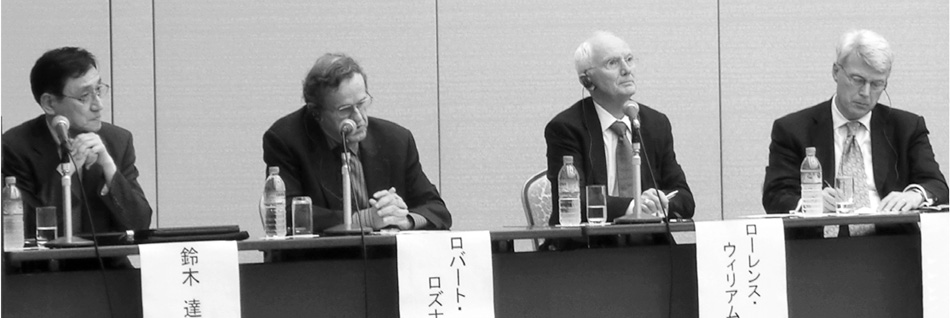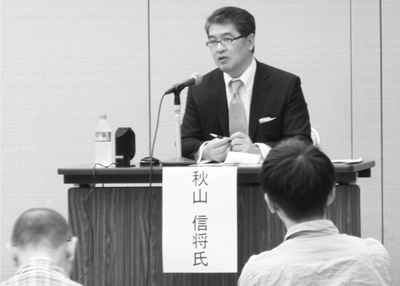How can nuclear technology be made safer? How should nuclear installations be protected from potential attacks by terrorist groups and from sabotage carried out by insiders? What policies should aspiring nuclear countries enact to fulfill their global commitment to the Nuclear Non-Proliferation Treaty (NPT)?
These questions and others were discussed at a recent Academy symposium held in Hiroshima, Japan, on June 26–28, 2013. The meeting, organized by the Codirectors of the Academy’s Global Nuclear Future Initiative, Scott D. Sagan (Stanford University) and Steven E. Miller (Harvard Kennedy School), with Senior Advisor Robert Rosner (University of Chicago), was cosponsored by the Japan Foundation Center for Global Partnership, the Center for International Security and Cooperation at Stanford University, and the “Hiroshima for Global Peace” Joint Project Executive Committee.
Hiroshima continues to stand as a stark and compelling symbol of the threat posed by the enduring presence of nuclear weapons around the world. The city is working to contribute actively to nuclear disarmament and to become a thriving hub for intellectual debate on nuclear issues. The choice of Hiroshima as the venue for the Academy’s symposium acknowledges the city’s expanding role in this global debate.
The two-day symposium, Learning from Fukushima: Improving Nuclear Safety and Security after Accidents, brought together nuclear experts from Australia, India, Indonesia, Japan, Malaysia, Singapore, Thailand, the United Kingdom, and the United States to discuss the March 11, 2011, nuclear accident at the Fukushima Daiichi Nuclear Power Plant and identify lessons on how to better prepare for, and respond to, nuclear accidents in the future.
 |
| Tatsujiro Suzuki (Japan Atomic Energy Commission), Robert Rosner (University of Chicago), Laurence G. Williams (University of Central Lancashire), and Scott D. Sagan (Stanford University) |
The symposium included panels on nuclear safety and security issues. In one panel discussion, nuclear experts Laurence G. Williams (University of Central Lancashire), Edward Blandford (University of New Mexico), and Nobumasa Akiyama (Hitotsubashi University) highlighted the need for all nuclear countries to establish and maintain a truly independent nuclear regulatory authority, to develop and continuously update comprehensive defense systems, and to prepare operators of nuclear power plants and political leaders to take action in post-nuclear accident crises.
 |
| Nobumasa Akiyama (Hitotsubashi University) |
In another presentation, Scott Sagan suggested that despite significant progress to strengthen nuclear safety regulations, in Japan and elsewhere in the world, efforts to protect nuclear installations from the threat posed by terrorist groups have substantially lagged behind. Nuclear operators continue to underestimate the potential danger posed by insiders. Sagan suggested the adoption of a suite of precautionary measures, such as reinforcing the physical protection of nuclear installations, conducting thorough background checks and trustworthiness tests of all personnel working within nuclear facilities, and establishing an anonymous reporting system that allows workers to report suspicious activities within a plant without fear of retaliation.
Other panels featured speakers from across South and Southeast Asia, including Itty Abraham (National University of Singapore), Thitinan Pongsudhirak (Chulalongkorn University, Thailand), Tanya Ogilvie-White (Australian Strategic Policy Institute), and Mohit Abraham (PXV Partners, New Delhi). The speakers discussed how the developing Vietnamese nuclear program will affect political stability in Southeast Asia, and they also explored the nuclear liability rules that seek to ensure that victims of nuclear accidents receive adequate compensation.
The conference included a public symposium organized by the Office of Governor Hidehiko Yuzaki of Hiroshima Prefecture. During the public meeting, Robert Rosner urged aspiring nuclear countries such as Vietnam to consider options for nuclear waste management at an early stage of their nuclear planning cycle to avoid the difficulties encountered by South Korea and Japan. Tatsujiro Suzuki (Japan Atomic Energy Commission) discussed the main institutional changes that had taken place in Japan’s nuclear sector since the Fukushima accident in order to regain the trust and confidence of the public.
The Global Nuclear Future Initiative is supported by the John D. and Catherine T. MacArthur Foundation, the Alfred P. Sloan Foundation, the William and Flora Hewlett Foundation, and Carnegie Corporation of New York. The Academy is grateful to these foundations for advancing the work of the Initiative.